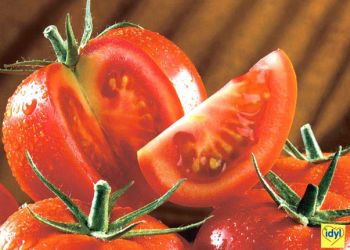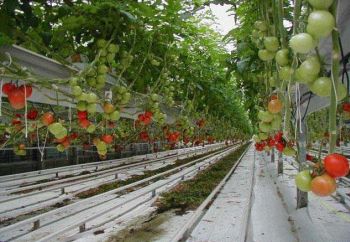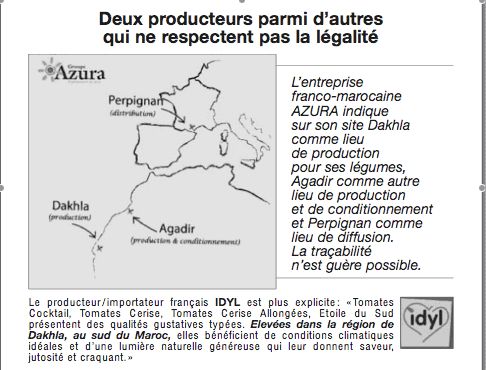
Published in Sahrawi news No. 128/June 2008,
Bulletin of the Swiss Committee for the support of the Sahrawi People.
See French language original here (pdf).
In the same way as the military and police occupation of Western Sahara, the seizure of its natural resources by Morocco serves both to affirm the legitimacy of its presence and satisfies the financial appetites of the big investors, who are largely foreign. The official propaganda describes it as ‘development of the southern provinces’. A development which happens without the participation of the indigenous population and for all practical purposes without any returns for them, except for some profiteers.
 As the resources are rich and varied, the areas of investment are many and varied. There is oil exploration, a sector in demand, fishing in waters formerly abounding in fish, phosphate, the price of which has soared, sand exported to the Canary Islands, tourism and finally agriculture, which seems paradoxical for a desert region.
As the resources are rich and varied, the areas of investment are many and varied. There is oil exploration, a sector in demand, fishing in waters formerly abounding in fish, phosphate, the price of which has soared, sand exported to the Canary Islands, tourism and finally agriculture, which seems paradoxical for a desert region.It is horticulture which has seen a veritable boom in recent years in the Dakhla region in the south west of the country.
We quote an account from the Regional Centre for Investment, the CRI of Dakhla: ‘The establishment of agro-industrial businesses has made rapid progress during these last years. In fact the agricultural potential of this almost desert region is not negligible and promises lucrative profits to investors.
The potential useful agricultural area of the region is estimated at 1 million hectares. Up until now, the agricultural exploitation is concentrated over 529.5 ha within six irrigated areas that run for 1,434 ha, in a radius of 70 kilometres around the town of Dakhla. Five of these areas are equipped with glasshouses and practical systems of irrigation which produce crops away from soil of good quality. Considerable financial capital is available and offers excellent opportunities for investment in agriculture under glass.’
 According to the Moroccan TV 2M the production of tomatoes, melons and cucumbers reached 30,000 tonnes in 2007, all exported to the North American, European and ex-Soviet bloc markets. The sector employs around 6,000 people, practically all from Morocco.
According to the Moroccan TV 2M the production of tomatoes, melons and cucumbers reached 30,000 tonnes in 2007, all exported to the North American, European and ex-Soviet bloc markets. The sector employs around 6,000 people, practically all from Morocco.These cultivations established in the middle of a desert require advanced technologies. They use only sun, water and space from the locality. The plants grow under glass, without soil, fed by solutions of nutrients, and irrigated by water drawn from depths of between 300m to 600m, from the extensive subterranean fossil layer. This is a non- ecological method of cultivation, which exhausts a precious resource that the pastoral economy of the Sahrawi knew how to preserve.
For these practices, following the example of other economic activities imposed on its occupied territories, Morocco could be indicted legally for plundering Sahrawi resources, in accordance with the decisions of the UN. In several resolutions, the General Assembly has demanded that the administering powers take care that none of the economic activities managed by them in the colonial or non autonomous territories harm the interests of the inhabitants. On the contrary, these activities must help the peoples of the territories to exercise their right to self-determination.
"Any administering Power that deprives the colonial peoples of Non-Self-Governing Territories of the exercise of their legitimate rights over their natural resources ... violates the solemn obligations it has assumed under the Charter of the United Nations”, wrote H. Corell, Under Secretary General of the UN, in a legal opinion in 2002. The sale of tomatoes from Dakhla is illegal, as is the export of phosphate from Bou Craa, the fishing agreement signed by Morocco with the European Union and many other economic activities.*
Does Switzerland import Sahrawi tomatoes?
 “Switzerland does not recognise the Moroccan annexation, the free trade agreement between the States of EFTA (Switzerland among them) and the Kingdom of Morocco does not apply to Western Sahara”, replied the SECO, (State Secretariat for the Economy) [when] questioned by the Committee. Adding that “the Federal Administration of Customs has not recorded any imports or exports in 2005 and 2006. For this reason, we have no knowledge of Swiss businesses involved in commercial trade between
“Switzerland does not recognise the Moroccan annexation, the free trade agreement between the States of EFTA (Switzerland among them) and the Kingdom of Morocco does not apply to Western Sahara”, replied the SECO, (State Secretariat for the Economy) [when] questioned by the Committee. Adding that “the Federal Administration of Customs has not recorded any imports or exports in 2005 and 2006. For this reason, we have no knowledge of Swiss businesses involved in commercial trade between Switzerland and Western Sahara.”Picture text above:
Two producers among others who do not respect the law.
The French-Moroccan business, AZURA, shows Dakhla on its website as the place of production of its vegetables, Agadir as another place of production and packaging, and Perpignan as the place of distribution. Tracking [these products] is scarcely possible.
The French producer/importer, IDYL, is more explicit: ‘Cocktail tomatoes, cherry tomatoes, elongated tomatoes, star of the south show classic delicious qualities. Grown in the Dakhla region, in the south of Morocco, they benefit from ideal climatic conditions and generous natural light which give them flavour, juiciness, zest.’
A procedure for verification of the origins of products is allowed for in the case of imports, but it is difficult to prove that products declared “originating from Morocco” come in reality from Western Sahara. This is especially true for the agricultural products that Morocco exports in large quantities.
The Moroccan tomatoes sold in Switzerland are perhaps Sahrawi tomatoes. Let us try to find out so that we can bring this to the attention of our authorities, who will be able to apply the current customs regulations.
But to consume ethically and ecologically, it is better to wait for local tomatoes!
*These aspects of the Moroccan occupation are denounced and fought by Western Sahara Resource Watch, WSRW, the network of international groups and activists that intervenes in the companies and investors working for Moroccan interests in occupied Western Sahara. Internet site: http://www.wsrw.org
Morocco allocates land in occupied Western Sahara to green hydrogen investors
Morocco’s ambitions to become a global green hydrogen powerhouse are accelerating. Yet, Rabat is allocating land in a territory it does not legally own.
US eyes minerals in occupied Western Sahara
Seeking to position itself as a key supplier of strategic minerals for Western powers, Morocco has signed a new agreement with the United States that covers Western Sahara’s waters and the critical minerals harboured there.
TAQA-Moeve obtains land in occupied Western Sahara
Morocco’s push for green hydrogen has taken a decisive step forward - on territory it does not legally own.
EU-Morocco Statement: autonomy without self-determination, law without lawfulness
A joint statement that came out of last week’s EU-Morocco Association Council asks readers to believe in a fiction: that an undefined autonomy plan imposed by an occupying power can satisfy the right to self-determination, and that respect for international law can coexist with the systematic ignoring of the EU’s own highest court.



